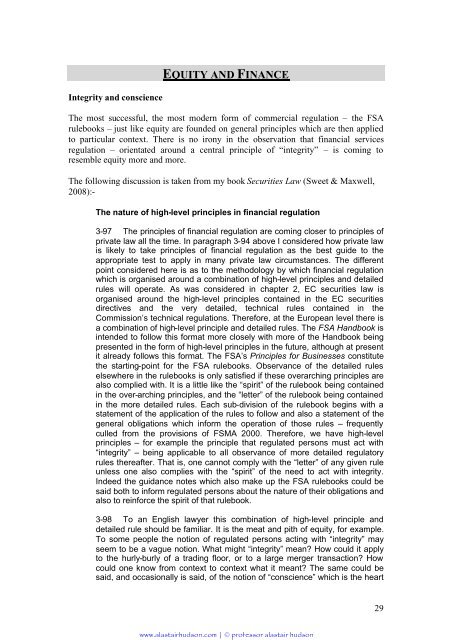England's dreaming equity, trust and conscience - alastairhudson.com
England's dreaming equity, trust and conscience - alastairhudson.com
England's dreaming equity, trust and conscience - alastairhudson.com
Create successful ePaper yourself
Turn your PDF publications into a flip-book with our unique Google optimized e-Paper software.
EQUITY AND FINANCEIntegrity <strong>and</strong> <strong>conscience</strong>The most successful, the most modern form of <strong>com</strong>mercial regulation – the FSArulebooks – just like <strong>equity</strong> are founded on general principles which are then appliedto particular context. There is no irony in the observation that financial servicesregulation – orientated around a central principle of “integrity” – is <strong>com</strong>ing toresemble <strong>equity</strong> more <strong>and</strong> more.The following discussion is taken from my book Securities Law (Sweet & Maxwell,2008):-The nature of high-level principles in financial regulation3-97 The principles of financial regulation are <strong>com</strong>ing closer to principles ofprivate law all the time. In paragraph 3-94 above I considered how private lawis likely to take principles of financial regulation as the best guide to theappropriate test to apply in many private law circumstances. The differentpoint considered here is as to the methodology by which financial regulationwhich is organised around a <strong>com</strong>bination of high-level principles <strong>and</strong> detailedrules will operate. As was considered in chapter 2, EC securities law isorganised around the high-level principles contained in the EC securitiesdirectives <strong>and</strong> the very detailed, technical rules contained in theCommission’s technical regulations. Therefore, at the European level there isa <strong>com</strong>bination of high-level principle <strong>and</strong> detailed rules. The FSA H<strong>and</strong>book isintended to follow this format more closely with more of the H<strong>and</strong>book beingpresented in the form of high-level principles in the future, although at presentit already follows this format. The FSA’s Principles for Businesses constitutethe starting-point for the FSA rulebooks. Observance of the detailed ruleselsewhere in the rulebooks is only satisfied if these overarching principles arealso <strong>com</strong>plied with. It is a little like the “spirit” of the rulebook being containedin the over-arching principles, <strong>and</strong> the “letter” of the rulebook being containedin the more detailed rules. Each sub-division of the rulebook begins with astatement of the application of the rules to follow <strong>and</strong> also a statement of thegeneral obligations which inform the operation of those rules – frequentlyculled from the provisions of FSMA 2000. Therefore, we have high-levelprinciples – for example the principle that regulated persons must act with“integrity” – being applicable to all observance of more detailed regulatoryrules thereafter. That is, one cannot <strong>com</strong>ply with the “letter” of any given ruleunless one also <strong>com</strong>plies with the “spirit” of the need to act with integrity.Indeed the guidance notes which also make up the FSA rulebooks could besaid both to inform regulated persons about the nature of their obligations <strong>and</strong>also to reinforce the spirit of that rulebook.3-98 To an English lawyer this <strong>com</strong>bination of high-level principle <strong>and</strong>detailed rule should be familiar. It is the meat <strong>and</strong> pith of <strong>equity</strong>, for example.To some people the notion of regulated persons acting with “integrity” mayseem to be a vague notion. What might “integrity” mean? How could it applyto the hurly-burly of a trading floor, or to a large merger transaction? Howcould one know from context to context what it meant? The same could besaid, <strong>and</strong> occasionally is said, of the notion of “<strong>conscience</strong>” which is the heart29www.<strong>alastairhudson</strong>.<strong>com</strong> | © professor alastair hudson













